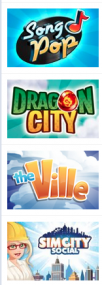y Ingrid Lunden

Facebook's (FB) push for more engagement on its platform, to drive advertising and other monetization efforts (and to counterbalance that drooping stock price), is showing some gains, according to updated figures on both games and app usage released by the company today. Facebook now has 235 million people playing games on Facebook.com, up from 205 million a year ago and up 8.4% since January. And the App Center, Facebook's newly revamped app marketplace launched in May, is now seeing 150 million monthly users, with 2.4 times more installs of apps compared to Facebook's old directory/dashboard and a next-day return rate of 35% to those apps after the first install (17% likely to return within a week).
These numbers are on the rise, but they are also somewhat modest: usage of apps and games on the network still work out to less than one quarter of Facebook's 955 million monthly active users, which paid Facebook 7.5 billion visits in the month of July alone, according to figures from Experian.
Meanwhile, the game development community continues to grow. Facebook notes that currently 5 of the top 10 developers are from Europe: Wooga, King.com, Peak Games, Rovio, and Social Point. This is a big incrase on last year, when only one European developer made the top 10, and is another sign of how Facebook's growth and usage at the moment is largely an international story.
King.com, now the number-two games developer after Zynga (ZNGA), currently brings in 51 million MAUs. Candy Crush Saga has 2.7 million daily active users, growing 100% in May with 800 million game plays to date. It has seen its installs since the App Center launched go up by 10%.
Another stat points to some of Facebook's mobile strategy: In July, Facebook says it referred people to Apple's App Store and Google Play more than 170 million times, through links that appear in people's timelines when their friends are playing Facebook-connected games. This is a development on a theme: Facebook is already known as a major traffic referral generator, often coming in second only to Google search in terms of driving traffic to websites via links in people's timelines, fan pages and other features. And in those instances where people are not playing directly on Facebook itself, Facebook wants to have the same role with mobile apps.
"We want to drive the same type of traffic we drive to mobile that we drive to web," said Matt Wyndowe, product manager for apps and games at Facebook, speaking today at the GDC Europe gaming conference taking place in Cologne, Germany. While this is obviously good for Facebook and its user engagement metrics, Wyndowe claims that developers benefit, too.
"Many game developers find that people who sign into their mobile apps with Facebook are more engaged and spend more money," he said. The company is continuing to expand the functionality it offers developers - for example with the recently updated iOS SDK.
Some examples that Facebook says prove the point: apparently 65% of people who play SongPop on mobile are signing in with Facebook, and they spend 35% more time and money on the app than those who do not use Facebook to connect (SongPop currently has 13 million MAUs on Facebook's platform). Similarly, Facebook users of Bingo Bash play 65% more sessions, and Facebook users spend eight times more money in the Diamond Dash game.
There is another way to look at that, however: those signing in with Facebook are probably going to be more engaged and interested players than those who are not signing in. Also signing in with Facebook makes things like paying for credits significantly easier, so the two in many cases can be inextricably linked.
No comments:
Post a Comment